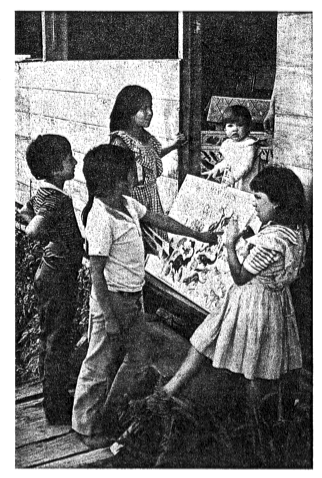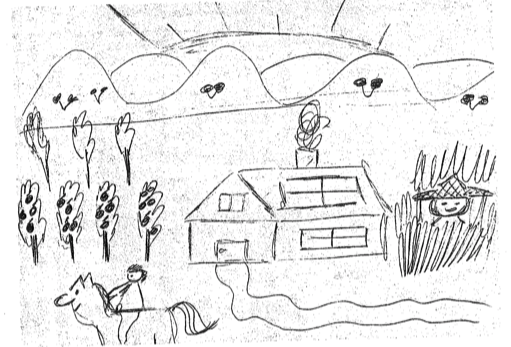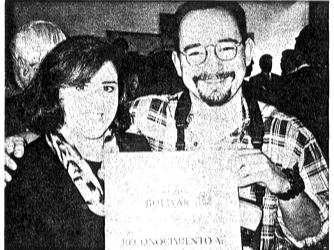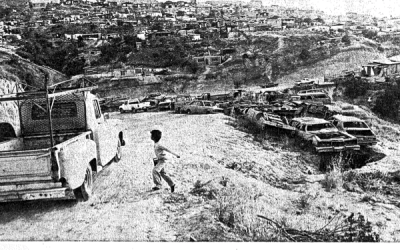La Planada
A Facilitator of Sustainable Development

The kids of La Planada
Guillermo Cantillo was sitting on the porch of the administrative offices at La Planada, Colombia, where I found him enjoying a sunny afternoon. He remarked that we had to take advantage of this rare occasion: in the rain forests, there are few afternoons like this one. We began to reminisce about his arrival on the farm in 1981 as a biologist, hired by the World Wildlife Federation in search of places that could justify a conservation project. In the first field reconnaissance, he knew that this was a special place. There were a great variety of flora and fauna; moreover, it was located in a multiethnic zone. Guillermo told me about his work and how he was dedicating more and more time to community development. Originally, he had arrived with the purpose of identifying birds. Now, he is linking conservation and community at this FES-supported nature reserve, which brings together researchers in the social, economic,biological and agronomic fields.
From its beginnings, La Planada emphasized the importance of interacting with neighboring communities to help them strengthen their organizations and eventually achieve self-reliance. This process enables the community to establish a harmonious and constructive relationship with the environment, especially with nature. And this is not an easy task as the region has eight Indian reservations, which in turn form part of the Awaa Tribal Council of Ricaurte, known as CAMAWARI. Surrounding the reservations are mestizo farmers and villagers who plunder some of the jungle daily. The reserve not only keeps flora and fauna in its natural state, but is a major reserve for an unusual bear, known as the “spectacled” bear because of eyeglass-like marks around its eyes.
La Planada eventually became a fundamental part of Guillermo’s life, as it is becoming part of mine. After a year at Harvard as a Mason Fellow, I returned to Colombia to work at FES Foundation, as Director of the Environment Division. I see many of the lessons of the past year about interdisciplinary solutions in the La Planada’s unique blend of biology and community development.
At La Planada, research projects oriented towards knowledge and conservation of biological diversity and the improvement of the quality of life of the residents of the area are designed, promoted and implemented. La Planada has integrated man as a vital part of the environment and understands the dynamics of socioeconomic systems.
Thirteen farmers and their families have made the commitment to manage their properties in an integrated manner, seeking a balance between agricultural exploitation and forest management. For the majority of the residents of the region it is more “profitable” to cut down the forest than to conserve it as “cleared” property is worth more. This and many other dilemmas are faced daily by the Education Program. With great enthusiasm and dedication, Amparo and MarÃa Fernanda work to maintain the Local Educational System for the 18 educational communities formed in the zone.
La Planada is preparing to promote new alternatives that will guarantee the well-being of the inhabitants of the region in a healthy balance with the environment. The intervention network has been woven; around the discussion table, concepts such as “carbon sequestration” and other current awareness topics are heard. There is a felt need to include more elements of environmental economics such as decision-making inputs and program operations. Aurelio Ramos, an environmental economist, is preparing to meet with the La Planada team for a week.

Ana María Palacio Jaramillo, 5, from Colombia, daughter of DRCLAS Volunteer María Clara Jaramillo and Dr. Guillermo Palacio, drew this scene of a Colombian coffee farm. She wants to see the ‘spectacled’ bears.
I became aware of how much the different personalities were making the project a success. La Planada director Pedro Moreno has learned that in this type of project setting, classic administration does not produce results. Juan Carlos Vera, now assistant administrator of La Planada, had always dreamed of working at La Planada. As a teenager, he became curious when something different was inserted in his birthplace: a nature reserve. He left the region for some time to work and study in large cities, but he returned. In his work at La Planada, he has had to deal with boundary conflicts, attend to visitors and know how much money there is in each one of the accounts. He is also a major promotor of the bears, which are on exhibit to the public. The bears are being prepared to reproduce in captivity and then to be released as their population increases. The visitor gets to see the bears at La Planada and ends up walking the nature paths where a guide gives them a lesson in ecology, one of only a few eco-tourism projects in Colombia. Today the guide might be Don Segundo; tomorrow a young man from the region: it is a way of drawing the local community into the project. Don Segundo has the honor of being the bears´ custodian, but he has also learned to be a guide. For him that is an honor.
Commitment to La Planada is a journey into the depths of Colombia. Researchers and other visitors must travel to the city of Pasto in southwestern Colombia and from there travel three and a half hours on the road that goes to the Pacific port of Tumaco, there is La Planada, a vision of the possibilities for environment and community. On the Andean hillsides is La Planada and its people: 3300 hectares of forest that seem to disappear in the expanse of a large green blanket that slides down the mountainsides to the sea.
Fall 1998
Jorge Ivan Restrepo, a 1997-98 Mason Fellow at the John F. Kennedy School of Government, is now director of the Environment Division of FES Foundation, Cali, Colombia. Natural Reserve La Planada, a FES Foundation project, can be contacted for more information: Phone 572- 6661700; FAX 572 6654300; e-mail fesambi@cali.cetcol.net.co.
Related Articles
Caballero wins Colombia’s top journalism prize
Building on work she started at the David Rockefeller Center for Latin American Studies, investigative journalist Maria Cristina Caballero has won Colombia’s top journalism prize…
Between Vengeance and Forgiveness
At the close of this century of death camps, killings fields and desaparecidos, there is perhaps no more urgent question than the one raised in Martha Minow’s useful new book: Can societies…
The Environment in Latin America
This issue of the DRCLAS NEWS deals with some of the environmental problems of Latin America, one of the priorities of the David Rockefeller Center for Latin American Studies…




